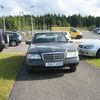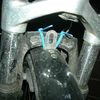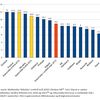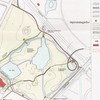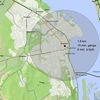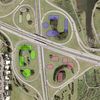Bloggfćrslur mánađarins, ágúst 2018
Mér sýnist hann vera ađeins 1/4 drćttingur á viđ Ásmund. Michael sćnski hćgrimađurinn fékkk 4,5 milljónir á fjórum árum en Ásmundur íslenski hćgrimađurinn halađi inn rúmlega ţá upphćđ (4,6 milljónir) á ađeins einu ári.
Nú bíđur mađur spenntur eftir ţví ađ eftirlit Alţingis krefji hann um endurgreiđslu eđa ađ skatturinn taki hann í skođun og krefji hann um nótur. Ţađ eru samt litlar líkur á ţví reyndar. Akstursgreiđslur og bifreiđahlunnindi eru heilög í í huga skattsins og ţar á bć vilja menn ekki hrćra í ţeim potti. Ţađ er miklu ţćgilegra ađ láta ţađ vera skattlítiđ eđa skattlaust og niđurgreiđa neyslu og akstur toppana áfram. ![]()

|
Krafđist aksturspeninga en var erlendis |
| Tilkynna um óviđeigandi tengingu viđ frétt | |
Stjórnmál og samfélag | 22.8.2018 | 10:32 (breytt kl. 10:38) | Slóđ | Facebook | Athugasemdir (2)
Ţađ virđist vera komiđ veiđileyfi á bilstjóra í símanum.
Ţá er bara ađ taka upp símann og fara ađ mynda bílstjóra í símanum, keyrandi yfir á rauđu ljósi, virđandi ekki stöđvunarskyldu o.s.frv. Fyrst Mogginn birtir svona geta víst flestir gert ţađ.
Ţađ fylgir reyndar ekki sögunni hvort sá sem mundađi símann var líka bílstjóri á ferđ. ![]()

|
Strćtisvagnstjóri í síma undir stýri |
| Tilkynna um óviđeigandi tengingu viđ frétt | |
Stjórnmál og samfélag | 21.8.2018 | 14:50 | Slóđ | Facebook | Athugasemdir (0)
Hér á eftir fer grein á ensku sem heitir The social ideology of the motorcar, eftir André Gorz sem er sótt héđan: http://unevenearth.org/2018/08/the-social-ideology-of-the-motorcar/
The social ideology of the motorcar
This 1973 essay on how cars have taken over our cities remains as relevant as ever
August 11, 2018
Image: Stuart Richards
by André Gorz
The worst thing about cars is that they are like castles or villas by the sea: luxury goods invented for the exclusive pleasure of a very rich minority, and which in conception and nature were never intended for the people. Unlike the vacuum cleaner, the radio, or the bicycle, which retain their use value when everyone has one, the car, like a villa by the sea, is only desirable and useful insofar as the masses don’t have one. That is how in both conception and original purpose the car is a luxury good. And the essence of luxury is that it cannot be democratized. If everyone can have luxury, no one gets any advantages from it. On the contrary, everyone diddles, cheats, and frustrates everyone else, and is diddled, cheated, and frustrated in return.
This is pretty much common knowledge in the case of the seaside villas. No politico has yet dared to claim that to democratize the right to vacation would mean a villa with private beach for every family. Everyone understands that if each of 13 or 14 million families were to use only 10 meters of the coast, it would take 140,000km of beach in order for all of them to have their share! To give everyone his or her share would be to cut up the beaches in such little strips—or to squeeze the villas so tightly together—that their use value would be nil and their advantage over a hotel complex would disappear. In short, democratization of access to the beaches point to only one solution—the collectivist one. And this solution is necessarily at war with the luxury of the private beach, which is a privilege that a small minority takes as their right at the expense of all.
Now, why is it that what is perfectly obvious in the case of the beaches is not generally acknowledged to be the case for transportation? Like the beach house, doesn’t a car occupy scarce space? Doesn’t it deprive the others who use the roads (pedestrians, cyclists, streetcar and bus drivers)? Doesn’t it lose its use value when everyone uses his or her own? And yet there are plenty of politicians who insist that every family has the right to at least one car and that it’s up to the “government” to make it possible for everyone to park conveniently, drive easily in the city, and go on holiday at the same time as everyone else, going 70 mph on the roads to vacation spots. The monstrousness of this demagogic nonsense is immediately apparent, and yet even the left doesn’t disdain resorting to it. Why is the car treated like a sacred cow? Why, unlike other “privative” goods, isn’t it recognized as an antisocial luxury? The answer should be sought in the following two aspects of driving:
Mass motoring effects an absolute triumph of bourgeois ideology on the level of daily life. It gives and supports in everyone the illusion that each individual can seek his or her own benefit at the expense of everyone else. Take the cruel and aggressive selfishness of the driver who at any moment is figuratively killing the “others,” who appear merely as physical obstacles to his or her own speed. This aggressive and competitive selfishness marks the arrival of universally bourgeois behavior, and has come into being since driving has become commonplace. (“You’ll never have socialism with that kind of people,” an East German friend told me, upset by the spectacle of Paris traffic).
The automobile is the paradoxical example of a luxury object that has been devalued by its own spread. But this practical devaluation has not yet been followed by an ideological devaluation. The myth of the pleasure and benefit of the car persists, though if mass transportation were widespread its superiority would be striking. The persistence of this myth is easily explained. The spread of the private car has displaced mass transportation and altered city planning and housing in such a way that it transfers to the car functions which its own spread has made necessary. An ideological (“cultural”) revolution would be needed to break this circle. Obviously this is not to be expected from the ruling class (either right or left).
Let us look more closely now at these two points.
When the car was invented, it was to provide a few of the very rich with a completely unprecedented privilege: that of traveling much faster than everyone else. No one up to then had ever dreamt of it. The speed of all coaches was essentially the same, whether you were rich or poor. The carriages of the rich didn’t go any faster than the carts of the peasants, and trains carried everyone at the same speed (they didn’t begin to have different speeds until they began to compete with the automobile and the airplane). Thus, until the turn of the century, the elite did not travel at a different speed from the people. The motorcar was going to change all that. For the first time class differences were to be extended to speed and to the means of transportation.
This means of transportation at first seemed unattainable to the masses—it was so different from ordinary means. There was no comparison between the motorcar and the others: the cart, the train, the bicycle, or the horse-car. Exceptional beings went out in self-propelled vehicles that weighed at least a ton and whose extremely complicated mechanical organs were as mysterious as they were hidden from view. For one important aspect of the automobile myth is that for the first time people were riding in private vehicles whose operating mechanisms were completely unknown to them and whose maintenance and feeding they had to entrust to specialists. Here is the paradox of the automobile: it appears to confer on its owners limitless freedom, allowing them to travel when and where they choose at a speed equal to or greater than that of the train. But actually, this seeming independence has for its underside a radical dependency. Unlike the horse rider, the wagon driver, or the cyclist, the motorist was going to depend for the fuel supply, as well as for the smallest kind of repair, on dealers and specialists in engines, lubrication, and ignition, and on the interchangeability of parts. Unlike all previous owners of a means of locomotion, the motorist’s relationship to his or her vehicle was to be that of user and consumer-and not owner and master. This vehicle, in other words, would oblige the owner to consume and use a host of commercial services and industrial products that could only be provided by some third party. The apparent independence of the automobile owner was only concealing the actual radical dependency.
"For the first time in history, people would become dependent for their locomotion on a commercial source of energy."
The oil magnates were the first to perceive the prize that could be extracted from the wide distribution of the motorcar. If people could be induced to travel in cars, they could be sold the fuel necessary to move them. For the first time in history, people would become dependent for their locomotion on a commercial source of energy. There would be as many customers for the oil industry as there were motorists—and since there would be as many motorists as there were families, the entire population would become the oil merchants’ customers. The dream of every capitalist was about to come true. Everyone was going to depend for their daily needs on a commodity that a single industry held as a monopoly.
All that was left was to get the population to drive cars. Little persuasion would be needed. It would be enough to get the price of a car down by using mass production and the assembly line. People would fall all over themselves to buy it. They fell over themselves all right, without noticing they were being led by the nose. What, in fact, did the automobile industry offer them? Just this: “From now on, like the nobility and the bourgeoisie, you too will have the privilege of driving faster than everybody else. In a motorcar society the privilege of the elite is made available to you.”
People rushed to buy cars until, as the working class began to buy them as well, defrauded motorists realized they had been had. They had been promised a bourgeois privilege, they had gone into debt to acquire it, and now they saw that everyone else could also get one. What good is a privilege if everyone can have it? It’s a fool’s game. Worse, it pits everyone against everyone else. General paralysis is brought on by a general clash. For when everyone claims the right to drive at the privileged speed of the bourgeoisie, everything comes to a halt, and the speed of city traffic plummets—in Boston as in Paris, Rome, or London—to below that of the horsecar; at rush hours the average speed on the open road falls below the speed of a bicyclist.
"When everyone claims the right to drive at the privileged speed of the bourgeoisie, everything comes to a halt, and the speed of city traffic plummets"
Nothing helps. All the solutions have been tried. They all end up making things worse. No matter if they increase the number of city expressways, beltways, elevated crossways, 16-lane highways, and toll roads, the result is always the same. The more roads there are in service, the more cars clog them, and city traffic becomes more paralyzingly congested. As long as there are cities, the problem will remain unsolved. No matter how wide and fast a superhighway is, the speed at which vehicles can come off it to enter the city cannot be greater than the average speed on the city streets. As long as the average speed in Paris is 10 to 20 kmh, depending on the time of day, no one will be able to get off the beltways and autoroutes around and into the capital at more than 10 to 20 kmh.
The same is true for all cities. It is impossible to drive at more than an average of 20 kmh in the tangled network of streets, avenues, and boulevards that characterise the traditional cities. The introduction of faster vehicles inevitably disrupts city traffic, causing bottlenecks-and finally complete paralysis.
If the car is to prevail, there’s still one solution: get rid of the cities. That is, string them out for hundreds of miles along enormous roads, making them into highway suburbs. That’s what’s been done in the United States. Ivan Illich sums up the effect in these startling figures: “The typical American devotes more than 1500 hours a year (which is 30 hours a week, or 4 hours a day, including Sundays) to his [or her] car. This includes the time spent behind the wheel, both in motion and stopped, the hours of work to pay for it and to pay for gas, tires, tolls, insurance, tickets, and taxes .Thus it takes this American 1500 hours to go 6000 miles (in the course of a year). Three and a half miles take him (or her) one hour. In countries that do not have a transportation industry, people travel at exactly this speed on foot, with the added advantage that they can go wherever they want and aren’t restricted to asphalt roads.”
It is true, Illich points out, that in non-industrialized countries travel uses only 3 to 8% of people’s free time (which comes to about two to six hours a week). Thus a person on foot covers as many miles in an hour devoted to travel as a person in a car, but devotes 5 to 10 times less time in travel. Moral: The more widespread fast vehicles are within a society, the more time—beyond a certain point—people will spend and lose on travel. It’s a mathematical fact.
The reason? We’ve just seen it: The cities and towns have been broken up into endless highway suburbs, for that was the only way to avoid traffic congestion in residential centers. But the underside of this solution is obvious: ultimately people can’t get around conveniently because they are far away from everything. To make room for the cars, distances have increased. People live far from their work, far from school, far from the supermarket—which then requires a second car so the shopping can be done and the children driven to school. Outings? Out of the question. Friends? There are the neighbors… and that’s it. In the final analysis, the car wastes more time than it saves and creates more distance than it overcomes. Of course, you can get yourself to work doing 60 mph, but that’s because you live 30 miles from your job and are willing to give half an hour to the last 6 miles. To sum it all up: “A good part of each day’s work goes to pay for the travel necessary to get to work.” (Ivan Illich).
"In the final analysis, the car wastes more time than it saves and creates more distance than it overcomes."
Maybe you are saying, “But at least in this way you can escape the hell of the city once the workday is over.” There we are, now we know: “the city,” the great city which for generations was considered a marvel, the only place worth living, is now considered to be a “hell.” Everyone wants to escape from it, to live in the country. Why this reversal? For only one reason. The car has made the big city uninhabitable. It has made it stinking, noisy, suffocating, dusty, so congested that nobody wants to go out in the evening anymore. Thus, since cars have killed the city, we need faster cars to escape on superhighways to suburbs that are even farther away. What an impeccable circular argument: give us more cars so that we can escape the destruction caused by cars.
"Since cars have killed the city, we need faster cars to escape on superhighways to suburbs that are even farther away. What an impeccable circular argument: give us more cars so that we can escape the destruction caused by cars."
From being a luxury item and a sign of privilege, the car has thus become a vital necessity. You have to have one so as to escape from the urban hell of the cars. Capitalist industry has thus won the game: the superfluous has become necessary. There’s no longer any need to persuade people that they want a car; it’s necessity is a fact of life. It is true that one may have one’s doubts when watching the motorized escape along the exodus roads. Between 8 and 9:30 a.m., between 5:30 and 7 p.m., and on weekends for five and six hours the escape routes stretch out into bumper-to-bumper processions going (at best) the speed of a bicyclist and in a dense cloud of gasoline fumes. What remains of the car’s advantages? What is left when, inevitably, the top speed on the roads is limited to exactly the speed of the slowest car?
Fair enough. After killing the city, the car is killing the car. Having promised everyone they would be able to go faster, the automobile industry ends up with the unrelentingly predictable result that everyone has to go as slowly as the very slowest, at a speed determined by the simple laws of fluid dynamics. Worse: having been invented to allow its owner to go where he or she wishes, at the time and speed he or she wishes, the car becomes, of all vehicles, the most slavish, risky, undependable and uncomfortable. Even if you leave yourself an extravagant amount of time, you never know when the bottlenecks will let you get there. You are bound to the road as inexorably as the train to its rails. No more than the railway traveller can you stop on impulse, and like the train you must go at a speed decided by someone else. Summing up, the car has none of the advantages of the train and all of its disadvantages, plus some of its own: vibration, cramped space, the danger of accidents, the effort necessary to drive it.
And yet, you may say, people don’t take the train. Of course! How could they? Have you ever tried to go from Boston to New York by train? Or from Ivry to Treport? Or from Garches to Fountainebleau? Or Colombes to l’Isle-Adam? Have you tried on a summer Saturday or Sunday? Well, then, try it and good luck to you! You’ll observe that automobile capitalism has thought of everything. Just when the car is killing the car, it arranges for the alternatives to disappear, thus making the car compulsory. So first the capitalist state allowed the rail connections between the cities and the surrounding countryside to fall to pieces, and then it did away with them. The only ones that have been spared are the high-speed intercity connections that compete with the airlines for a bourgeois clientele. There’s progress for you!
The truth is, no one really has any choice. You aren’t free to have a car or not because the suburban world is designed to be a function of the car and, more and more, so is the city world. That is why the ideal revolutionary solution, which is to do away with the car in favour of the bicycle, the streetcar, the bus, and the driverless taxi, is not even applicable any longer in the big commuter cities like Los Angeles, Detroit, Houston, Trappes, or even Brussels, which are built by and for the automobile. These splintered cities are strung out along empty streets lined with identical developments; and their urban landscape (a desert) says, “These streets are made for driving as quickly as possible from work to home and vice versa. You go through here, you don’t live here. At the end of the workday everyone ought to stay at home, and anyone found on the street after nightfall should be considered suspect of plotting evil.” In some American cities the act of strolling in the streets at night is grounds for suspicion of a crime.
So, the jig is up? No, but the alternative to the car will have to be comprehensive. For in order for people to be able to give up their cars, it won’t be enough to offer them more comfortable mass transportation. They will have to be able to do without transportation altogether because they’ll feel at home in their neighborhoods, their community, their human-sized cities, and they will take pleasure in walking from work to home-on foot, or if need be by bicycle. No means of fast transportation and escape will ever compensate for the vexation of living in an uninhabitable city in which no one feels at home or the irritation of only going into the city to work or, on the other hand, to be alone and sleep.
“People,” writes Illich, “will break the chains of overpowering transportation when they come once again to love as their own territory their own particular beat, and to dread getting too far away from it.” But in order to love “one’s territory” it must first of all be made livable, and not trafficable. The neighborhood or community must once again become a microcosm shaped by and for all human activities, where people can work, live, relax, learn, communicate, and knock about, and which they manage together as the place of their life in common. When someone asked him how people would spend their time after the revolution, when capitalist wastefulness had been done away with, Marcuse answered, “We will tear down the big cities and build new ones. That will keep us busy for a while.”
These new cities might be federations of communities (or neighborhoods) surrounded by green belts whose citizens-and especially the schoolchildren-will spend several hours a week growing the fresh produce they need. To get around everyday they would be able to use all kinds of transportation adapted to a medium-sized town: municipal bicycles, trolleys or trolley-buses, electric taxis without drivers. For longer trips into the country, as well as for guests, a pool of communal automobiles would be available in neighborhood garages. The car would no longer be a necessity. Everything will have changed: the world, life, people. And this will not have come about all by itself.
"Above all, never make transportation an issue by itself. Always connect it to the problem of the city, of the social division of labour, and to the way this compartmentalizes the many dimensions of life."
Meanwhile, what is to be done to get there? Above all, never make transportation an issue by itself. Always connect it to the problem of the city, of the social division of labour, and to the way this compartmentalizes the many dimensions of life. One place for work, another for “living,” a third for shopping, a fourth for learning, a fifth for entertainment. The way our space is arranged carries on the disintegration of people that begins with the division of labour in the factory. It cuts a person into slices, it cuts our time, our life, into separate slices so that in each one you are a passive consumer at the mercy of the merchants, so that it never occurs to you that work, culture, communication, pleasure, satisfaction of needs, and personal life can and should be one and the same thing: a unified life, sustained by the social fabric of the community.
From Le Sauvage September-October 1973. Translator not known.
André Gorz was a philosopher, journalist, and writer. He was known as one of the first ecosocialists and political ecologists.
Stjórnmál og samfélag | 13.8.2018 | 11:02 (breytt kl. 11:04) | Slóđ | Facebook | Athugasemdir (0)
Fćrsluflokkar
- Birtar blaðagreinar
- Bílar og akstur
- Bloggar
- Blogg um fréttir
- Dægurmál
- Ferðalög
- Fjármál
- Heilbrigðismál
- Hjólreiðar
- Löggæsla
- Matur og drykkur
- Menning og listir
- Menntun og skóli
- Óbirtar blaðagreinar
- Samgöngur
- Spaugilegt
- Stjórnmál og samfélag
- Tölvur og tækni
- Umhverfismál
- Utanríkismál/alþjóðamál
- Viðskipti og fjármál
- Vísindi og fræði
Eldri fćrslur
- Janúar 2025
- September 2024
- Maí 2024
- Mars 2023
- Ágúst 2020
- Mars 2019
- Janúar 2019
- Nóvember 2018
- Október 2018
- September 2018
- Ágúst 2018
- Júlí 2018
- Júní 2018
- Maí 2018
- Apríl 2018
- Mars 2018
- Febrúar 2018
- Janúar 2018
- Nóvember 2017
- Maí 2017
- Mars 2016
- Febrúar 2016
- Nóvember 2015
- Júlí 2015
- Október 2014
- Ágúst 2014
- Júlí 2014
- Júní 2014
- Apríl 2014
- Janúar 2014
- Nóvember 2013
- Október 2013
- Ágúst 2013
- Júlí 2013
- Mars 2013
- Desember 2012
- Nóvember 2012
- Október 2012
- September 2012
- Júlí 2012
- Maí 2012
- Apríl 2012
- Janúar 2012
- September 2011
- Júlí 2011
- Júní 2011
- Maí 2011
- Apríl 2011
- Febrúar 2011
- Janúar 2011
- Desember 2010
- Nóvember 2010
- Október 2010
- September 2010
- Ágúst 2010
- Júní 2010
- Maí 2010
- Apríl 2010
- Mars 2010
- Febrúar 2010
- Janúar 2010
- Desember 2009
- Nóvember 2009
- Október 2009
- September 2009
- Ágúst 2009
- Júlí 2009
- Júní 2009
- Maí 2009
- Apríl 2009
- Janúar 2009
Tenglar
Hjólreiđar
- Landsamtök hjólreiðamanna
- Íslenski fjallahjólaklúbburinn Samtök hjólreiđamanna međ ferđalög og samgöngur
- Bikeability UK Hjólafćrni verkefniđ á Bretlandi
- Cyclecraft Heimasíđa John Franklin höfund bókarinnar Cyclecraft
- Lifecycle UK Lifecycle, bresk samtök sem kenna hjólafćrni
- Tímaritið Momentum Samgöngu hjólreiđar og hjólamenning í Bandaríkjunum og Kanada
- Tímaritið Velovison Eitt skemmtilegasta hjólatímaritiđ, mikiđ međ liggjandi hjól
- Laid back bikes í Edinborg Fyrirtćki sem býđur ferđir á liggjandi hjólum í Edinborg í Skotlandi
Blogg um hjólreiđar
- Dashjol - Davíð A. Stefánsson Framvinda landfrćđilegrar rannsóknar á hjólreiđum á höfuđborgarsvćđinu
- Bjarney Halldórsdóttir Hjólađ í Reykjavík
- Hjólaðu maður! Blogg um hjólreiđar ađ norđan
- Hjóladagbók Bjössa 2009/2010 Hjólaleiđir, myndir, ferđatími og veđur
- Íslendingur í Kanada Halldór Gunnarsson "a bike nut from Iceland"
- Copenhagenize Blogg um hjólreiđar í Köben og allan heim
- Copenhagen Cycle Chic Tíska og hjól í Köben
- Chic Cyclist blog "Gellu" hjólreiđar
- Sænsk hjólablogg Yfirlit yfir sćnsk hjólablogg
- Malmö - Lund på cykel Marcus doktorsnemi á Skáni bloggar um hjólreiđar
- Karringcykelbloggen Blogg um hjólreiđar í suđur Svíţjóđ - karring = kelling
- Cycleville Stockholm Bloggađ frá Stokkhólmi um hjólreiđar
- Skoti í New York
Viđgerđir á hjólum
- Bicycletutor Myndbönd sem sýna viđgerđir á hjólum
- Park verkfæri Park verkfćri, međ sýnikennslu í viđgerđum
- Sheldon Brown Útskýringar á nánast öllu varđandi viđgerđir á hjólum
Ferđir á hjólum
- Crazyguyonabike: Bicycle Touring Safn af ferđafrásögnum, hér má skrá eigin ferđasögu



 mortenl
mortenl
 mberg
mberg
 hrannsa
hrannsa
 siggimaggi
siggimaggi
 vilberg
vilberg
 hallsteinn
hallsteinn
 hjolina
hjolina
 apalsson
apalsson
 sigurjonth
sigurjonth
 volcanogirl
volcanogirl
 kari-hardarson
kari-hardarson
 askja
askja
 lhm
lhm


